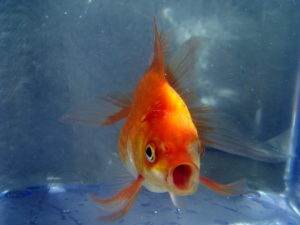Goldfish are popular thanks to, amongst other attractions, being one of the most low maintenance pets available. Less well known, however, is their astounding resilience. For years, researchers have puzzled over how some types of goldfish manage to survive for months in ice-covered lakes and ponds – most vertebrate species would die from the lack of oxygen in a matter of minutes. The answer has now been discovered by Cathrine Fagernes and her team based at the University of Oslo.
Like humans and most vertebrate, goldfish convert carbohydrates into lactic acid when starved of oxygen. Extraordinarily, C. auratus can then convert this lactic acid into alcohol using a pyruvate decarboxylase enzyme, which is analogous to an equivalent protein in brewer’s yeast. Similar species, which lack the mechanism, such as the common carp Cyprinus carpio, perish within minutes of anoxia. The pyruvate decarboxylase is always present, but crucially, it is heavily regulated in order to ensure that it is not active unnecessarily when oxygen is plentiful. Not only would this be wasteful, but also it could upset the finely tuned balance of the organism’s metabolism.
Thanks to this pathway, Carassius species of carp and goldfish can flourish whilst many of they counterparts perish over winter. Michael Berenrink, part of the team who made the discovery, say that in-the-field measurements indicate that blood alcohol levels of such survivors at over 55milligrams per 100millilitres: well over the legal limit for drivers in Norway…
Unfortunately, this discovery does not mean we can expect to buy a pint of goldfish-brewed craft beer at edgy hipster bars anytime soon – it has been calculated that it would take around 200 days for a trapped goldfish to produce a 4% ethanol solution. And no, this has not been tested, let alone taste tested.
